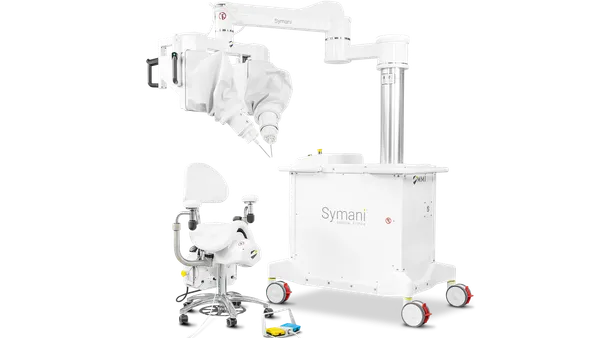Dive Brief:
- A drug-coated balloon being developed by Intersect ENT for use in chronic sinusitis treatment didn't meet a 30-day primary endpoint in an investigational study comparing it to an uncoated device, the company reported Monday.
- The Intersect device is designed to reduce inflammation by delivering mometasone furoate, a steroid, to dilated tissue while opening narrowed passageways in the sinuses. But an independent reviewer determined the frontal sinus patency grade observed among patients receiving the coated balloon didn't show statistically significant improvement at 30 days compared to outcomes in a group receiving an uncoated device.
- Still, the Menlo Park, California-based company highlighted smaller victories on a few secondary endpoints, reporting statistically significant reduction in inflammation and polypoid edema at all timepoints through 30 days, and in need for oral steroids at 30 days. Analysts at William Blair wrote to investors the results "speak to benefits in the localized delivery of mometasone furoate," calling the setback for the company "frustrating" but not "overly concerning."
Dive Insight:
Chronic sinusitis is a common, long-lasting condition in which mucus cannot properly drain from the sinuses, resulting in pressure in the face. Medication or surgery are sometimes needed to cut down on inflammation or correct blockages.
Intersect ENT noted upon enrolling the first patient in the trial last December there are approximately 200,000 sinus procedures per year in the U.S. The goal of the ASCEND study was to see whether introducing a localized steroid to dilated tissue could improve post-balloon dilation edema. Pending successful results of the study, the company said it planned to submit the product for FDA's premarket approval review.
Management struck a less bullish note Monday. "As the first trial of its kind for this product platform, the company recognized that the outcomes of the ASCEND trial could require further clinical study to support PMA approval," the company wrote in its announcement.
"It would have been a much-needed positive boost for sentiment if the device had met its endpoint and this is not the news beleaguered investors in this stock wanted to hear," analysts at William Blair wrote in a note to investors Monday. In the last six months, shares in the company have declined more than 40%.
The company is under the new leadership of Hologic diagnostics veteran Tom West. Former CEO Lisa Earnhardt departed in June to become executive vice president of medical devices at Abbott.
West said the trial will help "refine our clinical and regulatory pathway." The company said no serious adverse events were observed related to either the device or drug components of the product.
"We are obviously disappointed that this initial trial did not demonstrate superiority in its primary endpoint," he said in the announcement Monday. "However, as in our prior clinical research with drug-eluting implants, we again observed benefits of providing localized drug delivery of mometasone furoate through combined drug-device offerings."
Shares in the company fell almost 15% in premarket trading Monday.
The William Blair analysts said the development "takes upside off the table for the early to mid-2020s period," but argued the company's growth is more tied up in its Propel line of sinus implants and Sinuva nasal polyps treatment.
"Looking forward, we still believe the company will be able to return to double-digit growth in 2020, fueled by the change in leadership and strategic intent with Tom West at CEO, a refocus of the sales organization on the core PROPEL franchise, and several SINUVA tailwinds that could begin to help lift that product off the ground for a broader launch in 2020," the analysts wrote.













